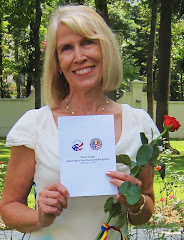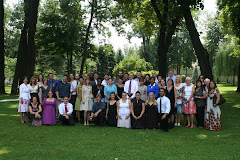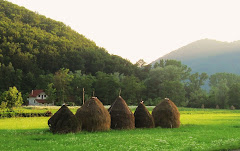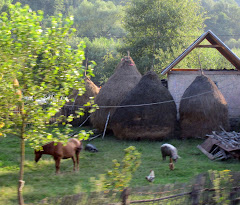
Walking into the office of my friend the Documentarian (media specialist) this afternoon, I threw up my hands and laughed, "I used to love Valentine's Day!" I'm valentined to bits, I'm up-to-here with paper, scissors, glue, and glitter, I'm over-glazed with cookie hearts and sprinkles. In short, I've had a *heart attack*!! And it's only February 10th! But I wanted all my students to know the legend of St. Valentine (16 class periods of that) and make valentines and have a cookie, so I had to do it this week.

It's funny how we take our customs so for granted until we try to help others understand and appreciate them. Actually, the Romanians have their own celebration of love in February, on the 24th. It's called Dragobete after their version of Cupid, god of love. It's an ancient holiday that apparently was all but ignored during the communist era, but is making quite a comeback now as a reaction to the increasing interest in Valentine's Day. Dragobete is related to nature more than our holiday. Supposedly, February 24th is when the birds choose their mates for the spring nest-building and reproducing. In ancient times the young people of the village would go into the forests and fields to find the first snow-drops or violets or any sign of spring. There they were encouraged to make promises of betrothals on that day to insure the protection of the gods. If snow was on the ground, the maidens collected it and melted it. The water was believed to have magical powers and was used in love potions and to wash their hair to make them especially appealing to the young men. If a woman wanted to be loving and alluring all year, she was supposed to touch a man from another village on that day. (Where? one wonders) To determine who would be the dominant partner, a couple took part in a "foot-upon-foot" maneuver. Today the holiday seems very much like our Valentine's Day though less commercial, and the cards I've located online are all nature-centered with the earliest tiny flowers and matrimonial birdies--all very sweet and delicate. So my introduction of our silly little valentines ("Bee Mine" with a buzzing bee and tulips, "You're a dear" with a doe holding a valentine, "Whale You Be Mine?" with a whale spouting valentines) took a bit of explaining. "Gluma (joke)," I would say, "It's a joke, see?" A few would get it, but cross-culture puns are hard. The highlight of my three-day marathon was when I told one class as they were finishing up that now they had pretty "felicitare" (cards) to give to someone they loved. One by one they each brought me one of their cards, complete with hugs and double-kisses. Well, maybe I do still like this holiday after all.
 Walking into the office of my friend the Documentarian (media specialist) this afternoon, I threw up my hands and laughed, "I used to love Valentine's Day!" I'm valentined to bits, I'm up-to-here with paper, scissors, glue, and glitter, I'm over-glazed with cookie hearts and sprinkles. In short, I've had a *heart attack*!! And it's only February 10th! But I wanted all my students to know the legend of St. Valentine (16 class periods of that) and make valentines and have a cookie, so I had to do it this week.
Walking into the office of my friend the Documentarian (media specialist) this afternoon, I threw up my hands and laughed, "I used to love Valentine's Day!" I'm valentined to bits, I'm up-to-here with paper, scissors, glue, and glitter, I'm over-glazed with cookie hearts and sprinkles. In short, I've had a *heart attack*!! And it's only February 10th! But I wanted all my students to know the legend of St. Valentine (16 class periods of that) and make valentines and have a cookie, so I had to do it this week. It's funny how we take our customs so for granted until we try to help others understand and appreciate them. Actually, the Romanians have their own celebration of love in February, on the 24th. It's called Dragobete after their version of Cupid, god of love. It's an ancient holiday that apparently was all but ignored during the communist era, but is making quite a comeback now as a reaction to the increasing interest in Valentine's Day. Dragobete is related to nature more than our holiday. Supposedly, February 24th is when the birds choose their mates for the spring nest-building and reproducing. In ancient times the young people of the village would go into the forests and fields to find the first snow-drops or violets or any sign of spring. There they were encouraged to make promises of betrothals on that day to insure the protection of the gods. If snow was on the ground, the maidens collected it and melted it. The water was believed to have magical powers and was used in love potions and to wash their hair to make them especially appealing to the young men. If a woman wanted to be loving and alluring all year, she was supposed to touch a man from another village on that day. (Where? one wonders) To determine who would be the dominant partner, a couple took part in a "foot-upon-foot" maneuver. Today the holiday seems very much like our Valentine's Day though less commercial, and the cards I've located online are all nature-centered with the earliest tiny flowers and matrimonial birdies--all very sweet and delicate. So my introduction of our silly little valentines ("Bee Mine" with a buzzing bee and tulips, "You're a dear" with a doe holding a valentine, "Whale You Be Mine?" with a whale spouting valentines) took a bit of explaining. "Gluma (joke)," I would say, "It's a joke, see?" A few would get it, but cross-culture puns are hard. The highlight of my three-day marathon was when I told one class as they were finishing up that now they had pretty "felicitare" (cards) to give to someone they loved. One by one they each brought me one of their cards, complete with hugs and double-kisses. Well, maybe I do still like this holiday after all.
It's funny how we take our customs so for granted until we try to help others understand and appreciate them. Actually, the Romanians have their own celebration of love in February, on the 24th. It's called Dragobete after their version of Cupid, god of love. It's an ancient holiday that apparently was all but ignored during the communist era, but is making quite a comeback now as a reaction to the increasing interest in Valentine's Day. Dragobete is related to nature more than our holiday. Supposedly, February 24th is when the birds choose their mates for the spring nest-building and reproducing. In ancient times the young people of the village would go into the forests and fields to find the first snow-drops or violets or any sign of spring. There they were encouraged to make promises of betrothals on that day to insure the protection of the gods. If snow was on the ground, the maidens collected it and melted it. The water was believed to have magical powers and was used in love potions and to wash their hair to make them especially appealing to the young men. If a woman wanted to be loving and alluring all year, she was supposed to touch a man from another village on that day. (Where? one wonders) To determine who would be the dominant partner, a couple took part in a "foot-upon-foot" maneuver. Today the holiday seems very much like our Valentine's Day though less commercial, and the cards I've located online are all nature-centered with the earliest tiny flowers and matrimonial birdies--all very sweet and delicate. So my introduction of our silly little valentines ("Bee Mine" with a buzzing bee and tulips, "You're a dear" with a doe holding a valentine, "Whale You Be Mine?" with a whale spouting valentines) took a bit of explaining. "Gluma (joke)," I would say, "It's a joke, see?" A few would get it, but cross-culture puns are hard. The highlight of my three-day marathon was when I told one class as they were finishing up that now they had pretty "felicitare" (cards) to give to someone they loved. One by one they each brought me one of their cards, complete with hugs and double-kisses. Well, maybe I do still like this holiday after all.







Aww, how sweet! What nice kids.
ReplyDeleteDragobete sounds really cool. I love the ancient pagan stuff lingering around, under, and behind all the Christianized holidays.
Love the end of this story, and love it that they love you! They're pretty smart kids.
ReplyDeleteLoved the ending -- what a tribute to you. I was reminded of a lesson I used, probably with 3rd graders, having them pretend to be a visitor from another planet observing some of our culture's holiday customs. It was readily apparent that we do some strange things in celebrating some of these holidays.
ReplyDeleteLoving it! Photos of the cards, please! xo
ReplyDeleteawww! As you can imagine, language barriers do not stop Ray from trying to tell jokes...the results can be amusing, but the jokes do not usually translate. Except maybe the physical humor...
ReplyDelete